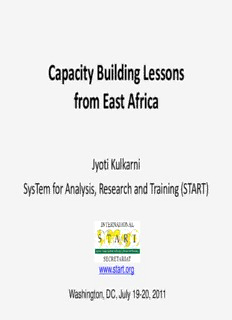
6.1 Capacity Building Lessons from East Africa - Africa Biodiversity PDF
Preview 6.1 Capacity Building Lessons from East Africa - Africa Biodiversity
Capacity Building Lessons from East Africa Jyoti Kulkarni SysTem for Analysis, Research and Training (START) www.start.org Washington, DC, July 19-20, 2011 START’s Scope of Action Approach to Capacity Building Capacity Building…. 1. Should be country driven and issue based 2. Should occur within a framework of integrated interdisciplinary problem solving 3. Is much more than training; requires institutional strengthening and human resource development 4. Should encourage potential for interaction and dialogues among diverse stakeholder groups The Conservation Context Adapted from: Elco van Beek (2009). Managing Water under Current Climate Variability. In, Ludwig, F., Kapat, P., van Schaik, H. and van der Valk, M (Eds.), Climate Change Adaptation in the Water Sector, Earthscan. START’s Capacity Building Portfolio Relevant to ABCG • Climate Change & Biodiversity Conservation in Advanced Training the Albertine Rift • Sustaining Ecosystem Goods & Services under Fellowships, Grants Climate Change (ACCFP and GEC grants) • Peri-Urban agriculture & climate change Assessments • AIACC, • CORDEX • Science-Policy & Stakeholder dialogues Communication • CORDEX – Climate services • ACCCA Foster collaborative networks of individuals and institutions at local/national/regional and global scales Biodiversity Conservation and Climate Change Albertine Rift Countries: Burundi, Congo, Rwanda, Tanzania and Uganda Partner: Institute of Resource Assessment, University of Dar es Salaam Funding support: The MacArthur Foundation • Advanced Education and Training, networking and communication. • For: practitioners, researchers, graduate students, educators and policy community • Phase 1 (2007-2008); Phase 2 (underway) • Emphasis on sustaining ecosystem goods and services and livelihoods Biodiversity Program Achievements Activity Capacity building contribution Curriculum Advanced Training courses; updated Master’s program at UDar; distance learning platform (in progress) Advanced Training and Theoretical training, special Training of Educators and Assessments practical hands-on assessment experience in 2 program Phases Stakeholder Dialogue Planned: Stakeholder discussions on regional implications of climate risks for ecosystem goods and services; shared experiences; and recommendations for action. Networking - regional/global Program alumni (diverse organizations) and faculty (NUR, Makerere, etc.) WCS, RNCEAR, SANBI, CORDEX, Advisory Committee, etc. Communication and NWP, CBD, DIVERSITAS, COP-15, Peer reviewed and grey Outreach literature, synthesis documents, web-platform, etc. ELAN, IPBES, GEO-BON, AEO Alumni Engagement • Government Institutions/Ministries : e.g. TAWIRI; TAFORI; Ministry of Agriculture, Tanzania; Geographic Institute of Burundi; Department of Forestry (Burundi); Ministries of Environment and Agriculture in Uganda; Uganda Wildlife Authority; Rwanda Development Board (Tourism) • Protected area personnel: TANAPA • Non-government institutions: JGI; WWF – Rwenzori; Greenwatch; TCCB, Congo; CARPE/IUCN PACO; OCEAN: Center for Research in Natural Sciences, DRCU; BCRD, Uganda; UDar; NUR. • Higher education: Master’s and PhD programs (potential experts) • Other training programs: UNITAR’s climate diplomacy program; SEI- UNISDR-UNU writeshop; ACCFP; UC Davis • University Educators: In all Albertine Rift countries Programmatic Challenges and Lessons Strengthening individuals - Access to information - Access to training in relevant tools and methodologies - Building communication skills - Building collaboration skills - Building skills to transform knowledge to action Strengthening institutions - IRA success story, others? Need “stars” at the institutional level Building and sustaining networks – Individuals and Institutions Sustaining the effort Evaluating outcomes Cross-Cutting Challenges Scaling-up – Spatially – Sectorally – Inclusive of Disaster Risk considerations! Integration across issues and actors – stakeholder categories – disparate programs – international efforts – e.g. IPBES, ELAN, GEO-BON, etc. Knowledge dissemination and linking knowledge to action
Description: